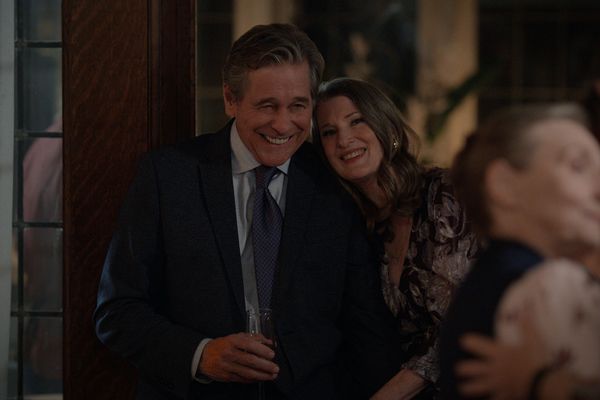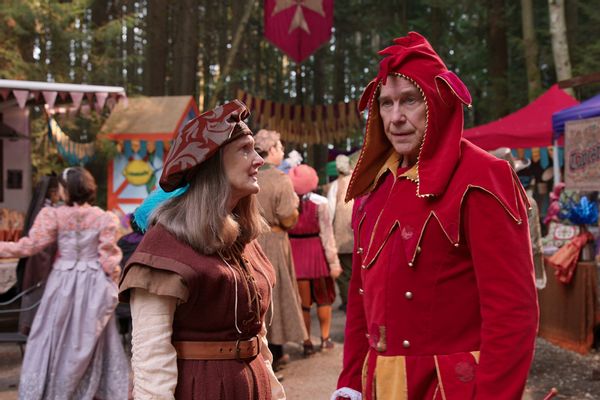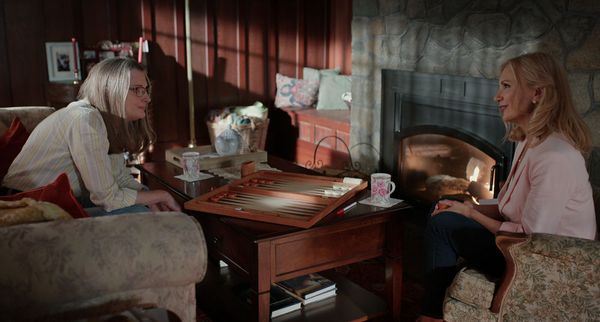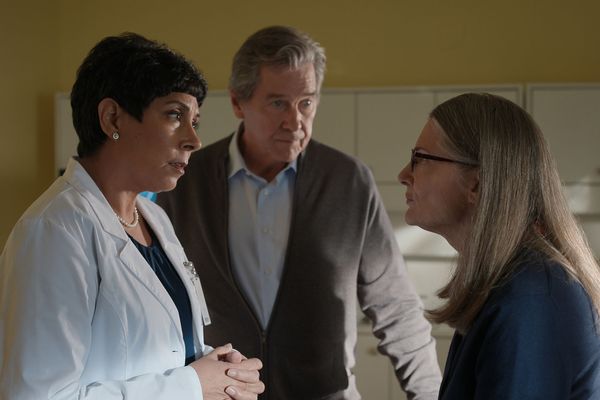
Maybe it's the Mr. Darcy effect.
The fictional Northern California town of Virgin River, despite being small, sure has its share of characters. And the Netflix show has attracted a following to rival the population of Los Angeles, where heroine Mel (Alexandra Breckenridge) a nurse practitioner who escapes to the picturesque community after tragedy, hails from.
Viewers have their favorites. Cameron stans, devotees of various couples like Mel and Jack, or Brie and Brady. But perhaps it's the transformation that I as a viewer went through, moving from being annoyed by a character to sympathetic to her plight, to having great empathy for her, even hoping she appears in more scenes. I'd like to propose an ode to a different kind of heroine: Hope, the cranky grand dame of "Virgin River."
She's not going to dye her gray hair for you. She's not going to stop talking about you. She's probably not going to like this article. But Hope is unapologetically herself and by doing so, provides a much-needed presence on TV: that of an older, uncompromising woman dealing with a life unexpectedly changed by illness.
Articles have called Hope the worst character on "Virgin River." Several bulging Reddit threads have declared her the most annoying while one boldly appoints her the "worst character in television history." (Perhaps that Redditer has not met Danny from "For All Mankind.")
Hope, played by the great Annette O'Toole, starts out the show as the mayor of Virgin River, steering a lovely, wooded riverfront town that has a bit of a drug problem (but never mind that; you won't be able to remember it, anyway). From the beginning, she's a meddler. She meddles to get Mel to town — and to stay there when things are not what Mel expects – to assist Hope's husband Vernon (Tim Matheson) in his small town doctoring. She meddles in bar owner Jack's relationship when she suspects he's having feelings for Mel. He does, and Hope might be a good matchmaker.
Except Hope has romantic problems of her own.
In the series' first season, Hope has been living separately from her husband for decades. Vernon still carries a torch for her, however. Let's give it up for Vernon, possibly the most romantic character in a community of hopeless (sometimes deludedly so) Romantics.

As Hope and Vernon have a fire-tested, long-term marriage so too they will deal with long-term illness.
Of all the things hot-tempered Hope gets annoyed about, the big, important stuff she takes in stride. When it matters, Hope is rock-solid, and Hope and Vernon provide an example not often present in fiction: that of an older, long-married couple working it out over time.
Yes, Vernon had an affair once, 20 years ago. Sure, Hope is still pissed about it. Yes, Hope tried to set him up with a frenemy, in a weird case of anxiety about her and Vernon's rekindled romance. But at the end of the day — or more specifically, at the end of an early season — Hope and Vernon stay together. They choose to, and choose each other again and again, even if their marriage is somewhat unconventional.

Hope keeps things to herself, and yet can't stop spreading news like wildfire. She has trouble calming her racing thoughts or keeping her mouth from spilling them. How does Mel find out Jack's ex is pregnant? From Hope. Who is the resident Mrs. Rachel Lynde of Virgin River? Hope.
Hope interferes because she cares. She loves Virgin River and all the people there (case in point: all the fundraisers she organizes for the town). She wants to do it all her way — like putting together a bench without first looking at the instructions — because she has difficulty trusting anyone. She lived alone for years, and has developed the eccentricity of a loner, once quipping: "I keep odd hours and vacuum in the nude." She's strong, independent and capable. She's had to be, and that toughness can feel like walls to others: impenetrable, made of steel.

This was an unexpected storyline of convenience for the show, necessitated by COVID, but though O'Toole took the change in stride, Hope struggles. For an independent person suddenly restricted by a disabling event . . . well, it sounds a lot like life right now.

Hope falls asleep in the middle of the day. She does not consistently remember important events, such as the fact that her best friend passed away. Stubbornly, she resists help. Importantly, Hope's recovery is not linear, as Mel's grief over her first husband and stillborn baby is not.
The talkative person now has difficulty finding the right word.
Hope has her own experience with grief and loss, which she shares with Mel in order to help the younger woman. In recovery from a brain injury, Hope has good days and bad days. As O'Toole said in the Parade interview: "I didn't feel like it was wrong to have her be able to be OK in some areas and not others, because it just doesn't seem like there's one way."
And Hope is angry about it. Finally, her famous crankiness has a worthy target: she's mad at life. She's frustrated with circumstances beyond her control. The brain injury has also changed her personality, a realistic characterization O'Toole manages with deft and sensitivity. Noted busybody Hope doesn't want to socialize as much. The talkative person now has difficulty finding the right word at times, but she tells Vernon: "Treat me like a human cat."
A cat is perhaps the best metaphor for Hope: more standoffish and discerning than a dog, yet capable of great love and warmth when it matters. Like my weird orange cat anyway, she'll come when you call. She'll drop everything (well, maybe everything except her sewing kit, which she'll bring) and come when her friends need her.
Cats aren't for everyone. Neither perhaps is Hope, yet the continuing storyline of her long-term disability humanizes her. And like many characters who start off grating, from Mr. Darcy to Logan Echolls, disarming realness can make them beloved. When their walls fall down, they are just like us, doing the best they can to be OK. And to be loved.
Hope has been on a journey, and we're along for the ride. Sure, Mel's path is a twisty, dramatic one, littered with love, sex, death and confusing paternity, but Hope's journey is the most complicated of the show. It's the most relatable. And by being so — and by Hope being herself — the most real. As Hope says: "I've come to the conclusion that you need to go after what you want, even if it's a rougher road."







